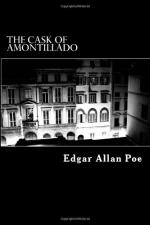|
This section contains 3,922 words (approx. 14 pages at 300 words per page) |

|
SOURCE: "Poe's The Cask of Amontillado' and the Code of the Duello," in Studia Germanica Gandensig, Vol. V, 1963, pp. 175-84.
In the following essay, Randall demonstrates how Fortunato's violations of the aristocratic code of honor motivate Montresor's revenge.
All critics agree that Edgar Allan Poe's "The Cask of Amontillado" is an almost perfect short story. Few, however, seem to have much to say about how Poe manages to achieve his extraordinary effect. I would like to propose a possible interpretation which might help explain the undeniable power which the story exerts on readers generation after generation.
A review of the relevant scholarship on the subject may furnish a starting point. George E. Woodbury calls it "a tale of Italian vengeance."(1) Arthur Hobson Quinn develops the idea a little by describing it as "a powerful tale of revenge, in which the interest lies in the implacable nature of the...
|
This section contains 3,922 words (approx. 14 pages at 300 words per page) |

|


